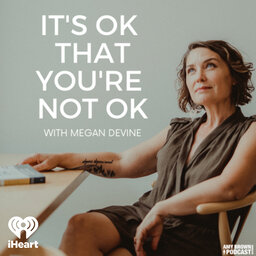Such Ferocious Beauty: with Margo Timmins of the Cowboy Junkies
Dementia means losing your person over and over again.
Margo Timmins and her siblings watched their father lose pieces of himself for years. They processed all that loss the way they always have: through music. The Cowboy Junkies vocalist joins us this week to talk about love, memory, and the ferocious beauty of turning towards what hurts.
*not sure who the Cowboy Junkies are? Google “cowboy junkies sweet jane” - I bet you’ll instantly recognize her voice.
In this episode we cover:
- The endless “interpretation” of music - each song means something completely different to the writer and the vocalist and the audience
- Why helping someone not be scared of dying isn’t the goal
- Everybody's hell is the correct hell for them, and everyone’s hell is valid. (huh?)
- How a neutral, logical approach to emotions helps you navigate truly impossible things (sometimes)
Looking for a creative exploration of grief? Check out the best selling Writing Your Grief course here.
“Beauty contains death and suffering and outcomes you did not want.” - Margo Timmins
Related episodes:
The Grief of Getting What You Want: with Chase Jarvis
Follow our show on Instagram, Facebook, Twitter, and TikTok @refugeingrief and @itsokpod on TikTok. Visit refugeingrief.com for resources & courses
About our guest:
Margo Timmins is the lead vocalist of the Cowboy Junkies, an iconic Canadian alternative country/blues/folk rock band. Find their new album, Such Ferocious Beauty, wherever you get your music. And get into their oldies, too.
About Megan:
Psychotherapist Megan Devine is one of today’s leading experts on grief, from life-altering losses to the everyday grief that we don’t call grief. Get the best-selling book on grief in over a decade, It’s Ok that You’re Not OK, wherever you get books. Find Megan @refugeingrief
Additional resources:
For dementia support, we love Dr. Natali Edmonds (@dementia_careblazers)
Want to talk with Megan directly? Join our patreon community for live monthly Q&A grief clinics: your questions, answered. Want to speak to her privately? Apply for a 1:1 grief consultation here.
Books and resources may contain affiliate links.
 It’s OK That You’re Not OK with Megan Devine
It’s OK That You’re Not OK with Megan Devine


